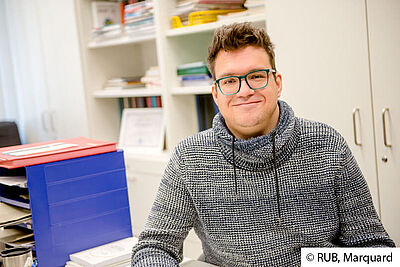Linguist Steffen Hessler analyses how the communication between IT experts and end users could be improved.
It’s such a relief once the professional arrives when the computer refuses to cooperate. But then it gets complicated when he or she explains which measures you could take when something isn’t working next time. There’s a reason why the brain shuts down the moment IT experts start explaining things. Steffen Hessler, who is doing his PhD at the Sec-Human Graduate School, researches them. He’s also investigating ways to improve communication.
Why is it so hard for IT specialists and users to understand each other?
IT specialists speak and write in a highly technical language. Technical languages are thoroughly standardised – as opposed to, for example, dialects – and enable experts to communicate very efficiently.
Moreover, people using technical language are more readily accepted and more highly esteemed in a group. In this respect, technical languages resemble varieties – i.e. variants such sociolects, dialects, and teenage slang.
A teenage girl uses a different register to talk to her parents than to her peers. If she applies for an internship, her mode of communication with the boss will differ from the codes she uses when talking to the aforementioned groups. This means, we generally adapt our register to the respective situation or group. In everyday communication, this happens automatically. This is the starting point of my research: technical languages are important, but communication should be adapted to the target group.
From personal experience, I can say that communication is kept succinct.
Which features characterise the language of IT experts?
From personal experience, I can say that communication is kept succinct. They want to communicate efficiently and economically. IT experts often use IT-specific abbreviations and acronyms in other contexts, such as 3C. 3C stands for CCC. This, in turn, is the acronym of Chaos Computer Club resp. Chaos Communication Congress. However, in doing so, they often achieve the exact opposite of their goal, seeing as information is lost along the way.
In interdisciplinary exchange, it’s important to make sure that communication is based on the same foundation. Since I have a background in linguistics and collaborate with IT specialists and researchers in other technological fields, this kind of research is doubly interesting to me.
Areas that use technical language benefit from model speakers whose example they can follow.
On the one hand, I try to facilitate better and more efficient collaboration. Here, disciplines are working together whose similarities and differences we have yet to figure out. On the other hand, it is essential for the purpose of my dissertation, which combines linguistics and IT security, to research in what way information from one discipline can be rendered applicable in the other discipline.
How could communication be improved?
Coded technical language has to be cracked open to an extent, in order to enable participants to communicate in a manner appropriate to their target group. Linguistic behaviour has to be adapted to the respective communication situation. The speaker must naturally be aware of the fact that they have to switch to a different linguistic code with people outside their discipline in order for the communication to be successful. Consequently, they put themselves in the other’s shoes, as it were.
Other areas using technical language benefit from model speakers whose example they can follow. As far as standard language is concerned, those speakers include news anchors, newsletters, professors – participants in communication who enjoy a high standing in society.
Terms should be unambiguous.
Consistency is as essential as the establishment of certain communication standards. Terms should be unambiguous.
An issue frequently voiced at IT conferences is the fact that the communication between different departments within an enterprise isn’t working. This leads to misunderstandings, delays, and even to certain ideas not being realised. In the field of IT security, the consequences can be very serious. Here, linguists might help render communication more efficient.
Sec-Human Graduate School
Since July 2016, the Ministry of Innovation, Science and Research has been funding the NRW Sec-Human Graduate School at Ruhr-Universität, in collaboration with TU Dortmund University and the University of Applied Sciences and Arts in Dortmund. The objective is to bridge the gap between theoretical IT security and its practical application in everyday life.
13 PhD students study interdisciplinary questions dealing with “Security for Humans in Cyberspace”. They are supervised by tutors and lecturers in the fields of electrical engineering, maths, media studies, German language and literature studies, anthropology, law, social sciences, and educational psychology, as well as partners from the industry.
General note: In case of using gender-assigning attributes we include all those who consider themselves in this gender regardless of their own biological sex.


